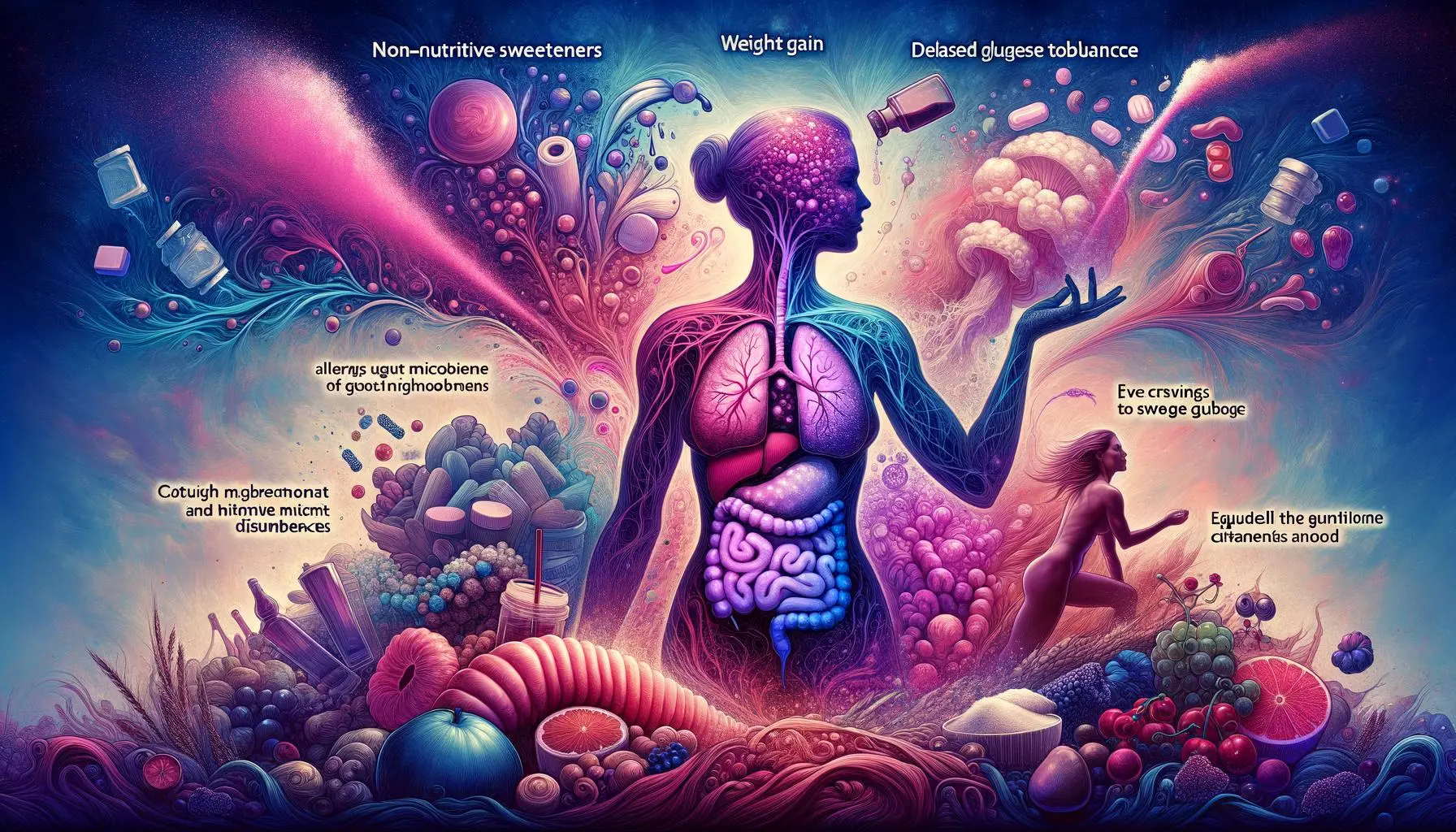· nutrition · 16 min read
The Paradox of Non-nutritive Sweeteners
Explore the complex relationship between non-nutritive sweeteners and weight management, including the surprising effects these substitutes may have on your health.

In This Post
The Fact Why Should I Care How To Put In Action Start Tomorrow Guide How does it effect my ability to focus How does it impact my daily life How does it help me make friends How does it help me manage stress How does it effect my mood Summary: Remember Refresher Checklist The Full Research Article CitationsPrint Out The Tomorrow Checklist!
Sign up for our newsletter and receive a copy today, so that, you can start tomorrow! Or the next day, or the day after that. I forget everything and starting things is hard at least for me so these checklists are godsend.
Print Out The Remember Refresher Checklist!
Sign up for our newsletter and download your own copy of the Remember Refresher Checklist, so that, you can easily put it on your fridge and help you stay on target towards your WHY. Every little bit helps.
Introduction to Non-nutritive Sweeteners and Weight Management

In a world where obesity and overweight statuses are on the rise, people are constantly on the lookout for strategies to manage their weight more effectively. Enter non-nutritive sweeteners, a category that has garnered attention and hope for many. Let’s delve deeper into understanding these alternatives and their appeal in weight management.
Understanding Non-nutritive Sweeteners
Non-nutritive sweeteners are substances used to sweeten foods and beverages without the added calories of sugar. They include a wide variety of artificial sweeteners like aspartame, saccharin, sucralose, and sugar alcohols, such as erythritol, xylitol, and natural alternatives like stevia. These sweeteners are much sweeter than sugar, which means a tiny amount is needed to achieve a sweet taste, translating to virtually zero calories.
These sugar substitutes are not only popular among those looking to lose or manage their weight but also among people with metabolic conditions such as type 2 diabetes. The Food and Drug Administration (FDA) has approved several non-nutritive sweeteners for consumption, and they are widely found in diet sodas, sugar-free gum, and calorie-reduced baked goods.
The Appeal of Zero-Calorie Sweeteners
The primary appeal of zero-calorie sweeteners lies in their promise to provide the sweetness of sugar without the associated calories, potentially aiding in weight management strategies and healthy eating habits. Here are some reasons for their popularity:
- Calorie Reduction: They can significantly cut the caloric content of many sweetened products, making them a tempting option for those trying to reduce caloric intake.
- Blood Sugar Control: For people with insulin resistance or type 2 diabetes, non-nutritive sweeteners might seem like a safe way to enjoy sweet flavors without the glycemic index spike that comes from sugar.
- Dental Health: Sugar substitutes do not contribute to tooth decay, making them a seemingly better option for oral health.
However, the relationship between non-nutritive sweeteners and weight management is more complex than it appears. While these substitutes offer certain benefits, emerging research suggests a paradoxical effect on weight and metabolic health that warrants a closer examination.
- [ ] Understand the variety of non-nutritive sweeteners available
- [ ] Recognize the importance of the FDA's role in safety approval
- [ ] Consider non-caloric sweeteners for calorie-reduced dietary plans
- [ ] Analyze emerging research on sweeteners and their impact on health
This introduction sets the stage for a deep dive into the multifaceted relationship between non-nutritive sweeteners and weight management. Stay tuned as we explore the surprising effects these sweet substitutes may have on your body and overall health.
The Mechanism: How Non-nutritive Sweeteners Affect the Body

Altering the Gut Microbiome
Non-nutritive sweeteners, found in many zero-calorie foods and diet sodas, have become a staple for individuals looking to reduce their sugar intake. However, it’s essential to understand the profound impact these sugar substitutes can have on our gut health. The gut microbiome consists of trillions of bacteria that play a crucial role in digesting food, absorbing nutrients, and supporting our immune system.
Research suggests that artificial sweeteners such as sucralose, aspartame, and saccharin can disrupt the balanced ecosystem of the gut microbiome. This disruption can lead to an imbalance where beneficial bacteria are outnumbered by harmful bacteria. Such an imbalance is concerning because a healthy gut microbiome is vital for overall health, including metabolic health and immune function.
The effects of artificial sweeteners on the gut microbiome include:
- Alteration in the composition of gut bacteria, which may lead to gut dysbiosis.
- A decrease in the population of beneficial bacteria, such as those that produce short-chain fatty acids which are crucial for gut health.
- Potential increase in pathogenic bacteria, which can lead to inflammation and increased risk of gastrointestinal disorders.
Moreover, these changes in the gut microbiome have been linked to an increased risk of glucose intolerance, a precursor to conditions such as obesity and Type 2 diabetes.
Disruption of Glucose Tolerance
Artificial sweeteners are designed to replicate the sweet taste of sugar but without the calories, making them attractive to those trying to manage their weight or blood sugar levels. However, despite their zero-calorie label, the consumption of non-nutritive sweeteners can lead to unintended effects on the body’s ability to process glucose.
The disruption of glucose tolerance refers to the body’s impaired ability to manage blood sugar levels after consuming food. Regular consumption of artificial sweeteners has been associated with changes in the body’s response to glucose. These changes can manifest as:
- Decreased insulin sensitivity, making it harder for the body to lower blood sugar levels effectively.
- Altered glucose absorption, which can lead to spikes and crashes in blood sugar levels, contributing to cravings and overeating.
- An increased risk of metabolic syndrome, a cluster of conditions that increase the risk of heart disease, stroke, and diabetes.
The irony is that while non-nutritive sweeteners are marketed as aids for weight management and diabetes control, their consumption may contribute to the very problems they are intended to prevent.
To maintain a healthy gut microbiome and support glucose tolerance, consider the following checklist for moderating the intake of artificial sweeteners:
- [ ] Limit consumption of foods and beverages that contain artificial sweeteners.
- [ ] Incorporate more natural, low-sugar foods into your diet.
- [ ] Stay hydrated with water instead of diet sodas or artificially sweetened drinks.
- [ ] Consult with a healthcare provider for personalized advice on managing sugar intake.
- [ ] Pay attention to how your body responds to foods with artificial sweeteners.
By understanding the complexities of how non-nutritive sweeteners affect the gut microbiome and glucose tolerance, individuals can make more informed decisions about their dietary choices. While it’s not necessary to completely eliminate artificial sweeteners from your diet, being mindful of their consumption and recognizing the potential impacts on your health is crucial for maintaining a balanced and nutritious diet.
The Paradox: Weight Gain and Metabolic Disorders

The enduring promise of non-nutritive sweeteners to deliver the sweet taste without the calories has been a main selling point for those looking to manage their weight. However, emerging research and anecdotal evidence suggest that the reality of weight management with zero-calorie sweeteners may not be so straightforward. This section delves into the myth versus the reality of using artificial sweeteners for weight loss and highlights the potential metabolic risks associated with their consumption.
Weight Management Myth vs. Reality
Myth: Consuming non-nutritive sweeteners will help you lose weight without making any other dietary changes.
Reality: While it’s tempting to believe that swapping sugar for calorie-free sweetening agents can single-handedly drive weight loss, the evidence tells a different story. Studies have increasingly shown that relying on artificial sweeteners may not lead to significant weight loss and, in some cases, might even contribute to weight gain and metabolic disorders.
The connection between artificial sweeteners, like sucralose, aspartame, and saccharin, and weight gain is complex and seems paradoxical. Here are some key points that shed light on this unexpected outcome:
Disruption of Natural Appetite Regulation: Artificial sweeteners can interfere with the body’s ability to gauge calorie intake due to their intense sweetness without the expected calories. This disruption might lead to increased food cravings and overeating.
Impacting Gut Health: These sweeteners can alter the gut microbiome, which plays a crucial role in metabolism and energy extraction from food. Changes in gut bacteria composition might influence insulin resistance and glucose tolerance, contributing to metabolic syndrome.
Insulin Response and Glucose Tolerance: Even though they are calorie-free, some artificial sweeteners can still trigger an insulin response. Over time, this can lead to insulin resistance, a condition that can result in type 2 diabetes and other metabolic issues.
Psychological Effects: There’s also a psychological aspect where people might feel they can eat more of other foods since they are saving calories on sweeteners. This “compensation” eating can lead to weight gain.
Here is a simple checklist to help manage your use of non-nutritive sweeteners and potentially mitigate their impact on weight and metabolism:
- [ ] Limit consumption of artificial sweeteners and explore natural alternatives like stevia
and erythritol, which have a lower impact on blood sugar levels.
- [ ] Monitor your cravings and food intake to ensure you're not overcompensating for the
calories saved by consuming zero-calorie sweeteners.
- [ ] Prioritize whole, unprocessed foods in your diet to support gut health and metabolism.
- [ ] Stay informed about the latest research on artificial sweeteners and their health
implications.
- [ ] Consult a healthcare professional or a dietitian for personalized advice on managing
weight and using non-nutritive sweeteners.
In conclusion, while non-nutritive sweeteners offer the allure of weight loss without sacrifice, the reality is more complicated. Weight management is a multifaceted challenge that requires a holistic approach beyond just swapping sugar with artificial sweeteners. Understanding the underlying factors that contribute to the paradoxical relationship between zero-calorie sweeteners, weight gain, and metabolic disorders is essential for anyone looking to make informed decisions about their dietary habits.
Individual Responses and Cravings

Variability in Human Response to Sweeteners
Human responses to artificial sweeteners vary significantly. Not everyone has the same reaction towards zero-calorie sweeteners. Factors like genetics, the type of sweetener consumed, and how often people use them can make a big difference. Some people might feel more satisfied after consuming products with artificial sweeteners, while others may experience increased hunger. Understanding this variability is crucial in determining how best to incorporate these sugar substitutes into a diet without undesirable side effects.
Sweetness without Calories: Triggering Cravings
Contrary to what many believe, sweetness without the calories can sometimes do more harm than good. When you consume something sweet, your body anticipates calories. Artificial sweeteners deliver the sweet taste without the associated calories, potentially leaving your body in a state of confusion. This mismatch can trigger cravings for more food, especially sweets or carbohydrates, to compensate for the “missing” calories. Over time, these increased cravings can lead to overeating and weight gain, undermining the purpose of using such sweeteners for weight management.
The psychological and physiological cues triggered by the sweetness of zero-calorie sweeteners can include:
- Increased Appetite: The sweet taste can stimulate appetite, making you want to eat more.
- Altered Taste Preferences: Regular consumption of highly sweetened foods can make naturally sweet foods, like fruits, less appealing.
- Snacking Habits: The desire to satisfy cravings can lead to unhealthy snacking behaviors.
Potential Behavioral and Psychological Effects
The influence of artificial sweeteners goes beyond mere physical health. They can also affect our behavior and psychology in several ways:
- Reward Mechanism: Sweet tastes activate the brain’s reward pathways, but without providing calories, the reward process might not be completely fulfilled, leading to a continuous cycle of craving and consuming sweet foods.
- Perception of Sweetness: Regular consumption of artificial sweeteners may dull our perception of natural sweetness, meaning we may start needing more sweetness to feel satisfied.
The Importance of Moderation and Mindful Consumption
Like anything related to diet and health, moderation and mindfulness are key when it comes to consuming non-nutritive sweeteners. Being aware of how your body and mind react to these substances can help you make better choices about using them. Here’s a quick checklist to help guide moderate and mindful consumption:
- [ ] Pay attention to how your body reacts after consuming artificial sweeteners.
- [ ] Try to limit the amount of zero-calorie sweetener products in your diet.
- [ ] Focus on whole foods like fruits for a healthy source of sweetness.
- [ ] Regularly monitor your cravings and consumption habits.
- [ ] Consult a healthcare professional if you notice adverse effects on your health or
weight.
Understanding your own body’s response and consuming artificial sweeteners in moderation, while maintaining a balanced diet, is essential. Mindfulness about your eating and drinking habits can support your weight management and health goals, despite the allure of calorie-free sweetening. Remember, the goal is to enjoy a varied and balanced diet that supports your wellbeing in every aspect.
FAQs on Non-nutritive Sweeteners and Health

The discussion surrounding non-nutritive sweeteners is complex, filled with various opinions and scientific findings that often lead to confusion. To demystify some of the most common inquiries, we delve into frequently asked questions concerning the safe use and health implications of artificial sweeteners.
Are Non-nutritive Sweeteners Safe for Diabetes?
For individuals managing diabetes, the use of non-nutritive sweeteners offers a way to enjoy sweet flavors without affecting blood sugar levels as significantly as sugar. Sweeteners such as stevia, sucralose, and aspartame are among those recognized by the Food and Drug Administration (FDA) for being safe when consumed within recommended limits. They do not contribute to the glycemic index like regular sugar, making them a preferable choice for blood sugar control. However, it’s essential to consult healthcare providers to understand personal health conditions and how non-nutritive sweeteners might affect them.
How Do Non-nutritive Sweeteners Compare to Natural Sweeteners?
When comparing non-nutritive sweeteners to natural sweeteners like honey or maple syrup, the key distinction lies in calorie content and the effect on blood sugar levels. While natural sweeteners contain calories and can influence blood sugar, non-nutritive sweeteners have little to no calories and minimal impact on glucose levels. This makes them a popular choice for weight management strategies. However, incorporating whole foods and reducing sweetener reliance overall, whether artificial or natural, is advisable for promoting healthy eating habits.
Can Non-nutritive Sweeteners Affect Children Differently?
Children’s consumption of non-nutritive sweeteners is a growing concern due to potential impacts on taste preferences and overconsumption of sweetened products later in life. Moderation is crucial, as excessive intake may predispose children to a preference for highly sweetened foods, contributing to unhealthy dietary patterns. The ADA recommends focusing on nurturing balanced dietary habits encompassing a variety of nutrients instead of relying heavily on sweetened products, whether the sweeteners are nutritive or non-nutritive.
To ensure safety and moderation in non-nutritive sweetener consumption, consider the following checklist:
- [ ] Consult with a healthcare professional, especially for specific conditions like diabetes
or obesity.
- [ ] Stick to the FDA's accepted daily intake levels of non-nutritive sweeteners.
- [ ] Educate children on the value of natural foods and balanced diets over artificially
sweetened products.
- [ ] Choose water or natural, unsweetened beverages as the primary drink choice.
- [ ] Read product labels to be aware of the kinds and amounts of sweeteners being consumed.
In summary, while non-nutritive sweeteners offer advantages in calorie-free sweetening and dietary management for conditions like type 2 diabetes, understanding their role within a broader nutritional context is essential. Moderation, mindful consumption, and a focus on wholesome dietary patterns remain key components of healthy eating habits, whether one chooses to incorporate non-nutritive sweeteners or not.
Conclusion - A Balanced Perspective on Sweeteners

As we’ve navigated through the complex landscape of non-nutritive sweeteners, it’s become clear that a balanced approach is pivotal. Understanding the role these sugar substitutes can play in our health is crucial for making informed dietary choices. Artificial sweeteners, including aspartame, sucralose, and stevia, present zero-calorie alternatives to sugar, but their impact on weight management and health is not straightforward.
Navigating the Sweetener Spectrum for Health
For individuals looking to manage their calorie intake or regulate blood sugar levels, non-nutritive sweeteners might seem like an attractive option. However, the crux lies in their moderation and the awareness of their potential effects on gut health, insulin resistance, and cravings.
To maintain a healthful diet while incorporating these sweeteners, consider the following checklist:
- [ ] Understand the different types of sweeteners: Nutritive vs. Non-nutritive.
- [ ] Read labels carefully: Look for artificial sweeteners like sucralose, aspartame, and
stevia in the ingredient list.
- [ ] Consider your health goals: Whether it's weight management or controlling Type 2
Diabetes.
- [ ] Keep moderation in mind: Even calorie-free sweetening options should be consumed in
moderation.
- [ ] Balanced diet: Pair sweeteners with a diet rich in fruits, vegetables, and whole grains.
- [ ] Listen to your body: Notice how it responds to different sweeteners, especially in terms
of cravings and gut health.
Adopting a mindful approach towards the consumption of non-nutritive sweeteners is essential. While they can serve as tools for reducing caloric intake and managing blood sugar levels, they are not a magic bullet for weight loss or health. It’s important to view them within the larger context of a balanced diet and healthy lifestyle.
The debate on the health impacts of artificial sweeteners versus sugar is ongoing. The Food and Drug Administration (FDA) classifies many non-nutritive sweeteners as Generally Recognized as Safe (GRAS), yet individual responses and potential long-term effects warrant careful consideration.
In conclusion, achieving a balance requires understanding both the benefits and limitations of non-nutritive sweeteners. By being informed and mindful, we can make choices that support our overall health and well-being, navigating the sweetener spectrum with confidence and caution.
Relevant Links - Non-nutritive Sweeteners Information
In our digital age, easy access to comprehensive information about health and nutrition can empower us to make more informed choices about what we consume. Non-nutritive sweeteners, while being a hot topic due to their potential effects on weight management, metabolic health, and overall wellness, can be better understood through reliable sources. Below are three essential resources for those looking to deepen their understanding of sugars, artificial and natural sweeteners, and their health implications:
WHO Guidelines on Sugar Intake
The World Health Organization (WHO) provides guidelines on the recommended sugar intake for both adults and children. Understanding these recommendations is crucial for managing calorie intake and maintaining a balanced diet. This resource is especially helpful for those looking to compare the effects of nutritive sweeteners vs. non-nutritive sweeteners on obesity and overweight issues.
Harvard’s Insight on Sweeteners
Harvard School of Public Health offers an exhaustive look at various sweeteners, including aspartame, saccharin, sucralose, stevia, and erythritol. The nuances of each, their applications, and how they fit into healthy eating habits are discussed in detail. This source is invaluable for understanding the broad spectrum of sweeteners and their glycemic index implications.
ADA on Dietary Sweeteners
The American Diabetes Association (ADA) delves into nutrition and dietary supplements, emphasizing how sweeteners impact individuals with Type 2 diabetes and those managing insulin resistance. Whether you’re navigating dietary guidelines due to a diabetes diagnosis or simply seeking to understand the metabolic syndrome implications of your diet, this resource is a wealth of knowledge.
For a quick reference, here’s a checklist of questions to consider when reading through these resources:
- Do the guidelines discuss both artificial and natural sweeteners?
- Is there information on how sweeteners affect gut health?
- Are the effects of sweeteners on sugar cravings and insulin resistance mentioned?
- How do the resources address dietary guidelines for managing Type 2 diabetes?
- What do the sources say about weight management strategies in the context of sweetener
consumption?
Turning to authoritative sources can demystify the complex narrative around non-nutritive sweeteners. By incorporating insights from the World Health Organization, Harvard School of Public Health, and the American Diabetes Association into our dietary decisions, we can move towards a more balanced and healthful approach to sweetener consumption. Whether it’s understanding the psychological effects of sweet taste or navigating the Food and Drug Administration (FDA)’s stance on sweeteners, informed choices lead to healthier lives.





